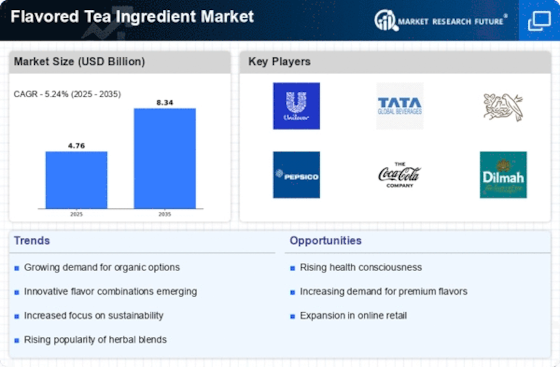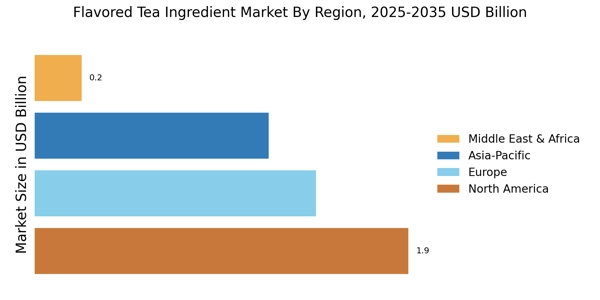Diverse Flavor Innovations
Innovation in flavor profiles is a significant driver within the flavored tea Ingredient Market. As consumer preferences evolve, there is a growing demand for unique and diverse flavor combinations that cater to a wide range of palates. Manufacturers are experimenting with exotic ingredients, such as matcha, turmeric, and various fruit blends, to create novel tea experiences. This trend is supported by market data indicating that flavored teas with innovative profiles are outperforming traditional options in sales. The introduction of limited-edition flavors and seasonal offerings further stimulates consumer interest and engagement. As the market continues to embrace creativity in flavor development, the potential for growth in flavored tea ingredients remains robust.
Health Benefits of Flavored Tea
The rising awareness of health benefits associated with flavored tea ingredients is a pivotal driver in the Flavored Tea Ingredient Market. Consumers increasingly seek beverages that offer functional advantages, such as antioxidants and vitamins. Research indicates that flavored teas, particularly those infused with herbs and fruits, can enhance overall well-being. For instance, the inclusion of ingredients like hibiscus and ginger has been linked to improved digestion and cardiovascular health. This trend is reflected in market data, which shows a steady increase in sales of flavored teas, with a projected growth rate of approximately 5% annually. As consumers prioritize health-conscious choices, the demand for flavored tea ingredients that promote wellness is likely to continue its upward trajectory.
Sustainability and Ethical Sourcing
Sustainability and ethical sourcing practices are becoming increasingly important in the Flavored Tea Ingredient Market. Consumers are more informed and concerned about the environmental impact of their purchases. This has led to a growing preference for brands that prioritize sustainable farming practices and ethical sourcing of ingredients. For example, tea producers that engage in fair trade practices and organic farming are gaining traction among environmentally conscious consumers. Market data suggests that products labeled as organic or sustainably sourced are experiencing higher sales growth compared to conventional options. This shift towards sustainability not only appeals to consumer values but also enhances brand loyalty, making it a crucial driver in the flavored tea ingredient sector.
Cultural Influences and Globalization
Cultural influences and globalization play a crucial role in shaping the Flavored Tea Ingredient Market. As consumers become more exposed to diverse culinary traditions, there is a growing interest in international flavors and tea varieties. This trend is particularly evident in the rising popularity of Asian-inspired flavored teas, such as bubble tea and chai. Market data indicates that the demand for these culturally inspired beverages is on the rise, with a notable increase in sales of flavored teas that incorporate traditional ingredients from various cultures. This blending of flavors not only enriches the consumer experience but also drives innovation in the flavored tea ingredient sector, as brands seek to cater to a more diverse audience.
Convenience and Ready-to-Drink Options
The increasing demand for convenience is a notable driver in the Flavored Tea Ingredient Market. Busy lifestyles have led consumers to seek ready-to-drink (RTD) tea options that offer flavor and health benefits without the need for preparation. This trend is evident in the rising popularity of bottled flavored teas, which are often fortified with vitamins and minerals. Market data reveals that the RTD tea segment is expected to grow significantly, with a compound annual growth rate of around 6% over the next few years. As manufacturers respond to this demand by introducing new flavored tea products in convenient packaging, the market for flavored tea ingredients is likely to expand accordingly.

















